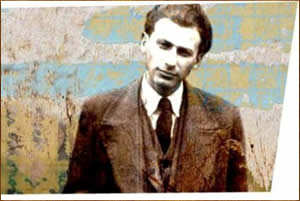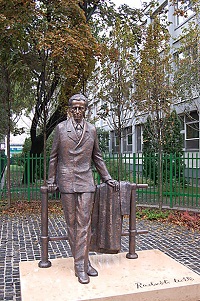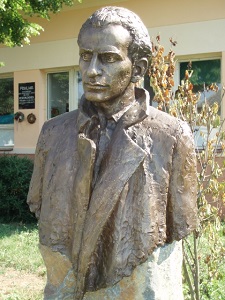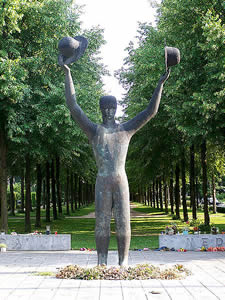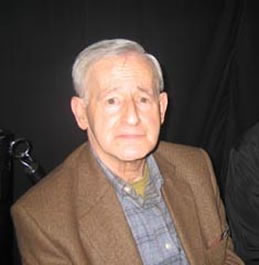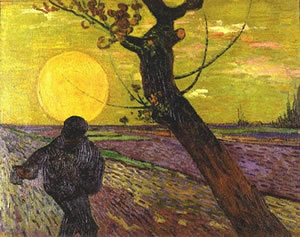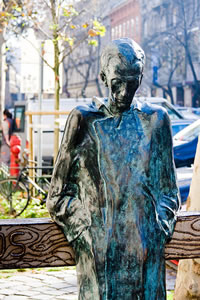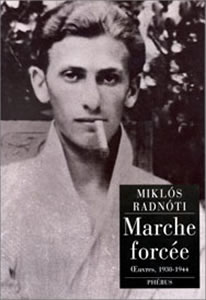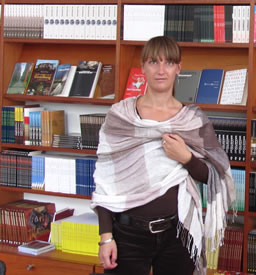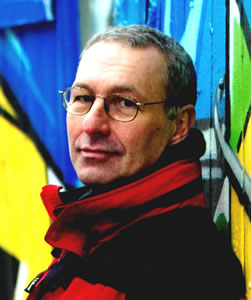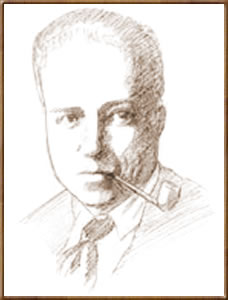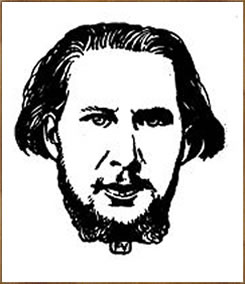De Turkse schrijver, dichter, vertaler en journalist Roni Margulies werd geboren op 5 mei 1955 in Istanbul. Zie ook alle tags voor Roni Margulies op dit blog.
Begane Grond
Our lift talks to me, as I go up
or down, in a gentle, protective tone.
“We are here,” she says “you may go”.
She tells me the floor we have reached,
always lets me know where I am.
But whenever I descend to go out
into these streets I do not belong to,
“Begane grond” she intones, in a voice
which sounds to me slightly concerned,
“Here,” I think she says, “here’s the world,
open the door, go. And do not fret,
everyone here is as foreign as you are.
No one belongs. Not anywhere.”
Vertaald door Roni Margulies
Wear And Tear
I had a blue pullover,
a cross between turquoise and sky blue.
It was my favourite, the one I wore most often.
We went through a lot together, it and I,
its colour let friends recognise me from afar.
It was a gift from Elsa;
time took its toll on it.
It thinned at the elbows, the cuffs became slack,
it sagged, wouldn’t fit me properly,
holes could no longer be darned.
Finally, together with other old clothes,
my mother sent it off to a home for the elderly.
It was on a day
years after I had last seen Elsa.
Now, I suppose, there’s an old man
wandering the streets of Istanbul,
walking into shops, gazing at the sea,
on his aged frame a blue pullover:
proof Elsa once loved me.
Vertaald door Savkar Altinel
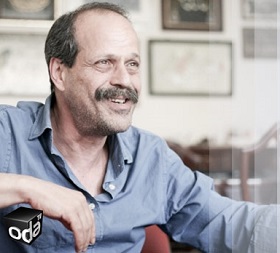
Roni Margulies (Istanbul, 5 mei 1955)
De Hongaarse dichter en schrijver Miklós Radnóti werd geboren op 5 mei 1909 in Boedapest. Zie ook alle tags voor Miklós Radnóti op dit blog.
Letter To My Wife
Beneath, the nether worlds, deep, still, and mute.
Silence howls in my ears, and I cry out.
No answer could come back, it is so far
From that sad Serbia swooned into war.
And you’re so distant. But my heart redeems
Your voice all day, entangled in my dreams.
So I am still, while close about me sough
The great cold ferns, that slowly stir and bow.
When I’ll see you, I don’t know. You whose calm
Is as the weight and sureness of a psalm,
Whose beauty’s like the shadow and the light,
Whom I could find if I were blind and mute,
Hide in the landscape now, and from within
Leap to my eye, as if cast by my brain.
You were real once; now you have fallen in
To that deep well of teenage dreams again.
Jealous interrogations: tell me; speak.
Do you still love me? Will you on that peak
Of my past youth become my future wife?
– but now I fall awake to real life
And know that’s what you are: wife, friend of years
– just far away. Beyond three wild frontiers.
And Fall comes. Will it also leave with me?
Kisses are sharper in the memory.
Daylight and miracles seemed different things.
Above, the echelons of bombers’ wings:
Skies once amazing blue with your eyes’ glow
Are darkened now. Tight with desire to blow,
The bombs must fall. I live in spite of these,
A prisoner. All of my fantasies
I measure out. And I will find you still;
For you I’ve walked the full length of the soul,
The highways of countries! – on coals of fire,
If needs must, in the falling of the pyre,
If all I have is magic, I’ll come back;
I’ll stick as fast as bark upon an oak!
And now that calm, whose habit is a power
And weapon to the savage, in the hour
Of fate and danger, falls as cool and true
As does a wave: the sober two times two.
Vertaald door Zsuzsanna Ozsvath en Frederick Turner
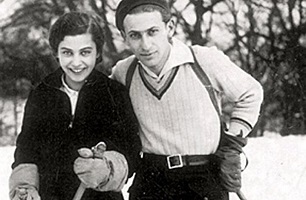
Miklós Radnóti (5 mei 1909 – 9 november 1944)
Miklós Radnóti met zijn geliefde vrouw Fanni Gyarmati voor WO II
De Nederlandse dichteres Petra Else Jekel werd in Arnhem geboren op 5 mei 1980. Zie ook alle tags voor Petra Else Jekel op dit blog.
uren zat ik naast je op een treinbank, ik had
2
uren zat ik naast je op een treinbank, ik had
het mes in de mond: herkende je me niet?
het buikmeisje dat je brieven schrijft en jij
pijl in de hand, ik moet je ophalen denk ik
maar ik weet nooit waar, in amsterdam
zag je de gifmenger en je zei het tegen mij
drie woorden heb ik: kling en punt en vuur
we zeggen niets, we zitten, je haar heb je
kort afgesneden van verdriet, in berlijn
ben je content nu heb ik je zien dansen
zeg je, ik alle passen heb ik zelf bedacht
bedronken, arm in arm, de laatste nacht

Petra Else Jekel (Arnhem, 5 mei 1980)
De Amerikaanse schrijver Morton Rhue (pseudoniem van Todd Strasser) werd geboren op 5 mei 1950 in New York. Zie ook alle tags voor Morton Rhue op dit blog.
Uit: Give a Boy a Gun
“About Gary
Mrs. Searle and Gary moved into the house next to ours the day before second grade began. So the first time I actually saw him was at the bus stop. He was kind of quiet, but friendly enough. Some of the kids at the bus stop would play soccer in the street in the morning. I was glad when Gary came along, because I wasn’t into that, and with Gary there it gave me something to do. We’d most-ly talk about stuff like Magic cards and video games and what we saw on TV. If you want to know the truth, I think Mrs. Searle was a little overprotective. I guess because she was the only parent. She always wanted to know where Gary was going, and would he be warm enough, and junk like that. Gary would just roll his eyes. Until Brendan came along, I think I was pretty much Gary’s best friend. The thing about Gary was that mysterious part of him that you never knew. It was like something he kept hidden and private. I can’t explain it, but I could feel it when I was with him. He’d just get quiet and you knew he was a dillion miles away. I always thought maybe it was some-thing about his parents getting divorced. — Ryan Clancy, a friend of both Gary’s and Brendan’s
Gary Searle was a very sweet little boy with slightly reddish brown hair and big, round eyes. He was polite and quiet and always did what he was told. I do recall that some of the children teased him about his weight. But you know how kids are at that age. — Ruth Hollington, Gary’s fourth-grade teacher at Middletown Elementary School
I didn’t move to Middletown until fifth grade, so I didn’t know Gary before that.
After we started hanging out, he’d sometimes talk about what it was like when he was younger. About the divorce and how com-pletely nasty it was, and how after it was over, his dad just left and never paid child support or called or anything. That was a huge thorn in Gary’s side. He just couldn’t get over that. —Allison Findley, Gary’s on-and-off girl-friend at Middletown High School
It was an ugly divorce. All that yelling and fighting. Arguing over money. Gary was caught in the middle, and sometimes I guess I used him to get what I thought I needed. What we both needed. It’s a terrible thing to put a child through, but I didn’t know what else to do. —Cynthia Searle, Gary’s mother
“As parents, teachers, and other adults look for ways to reach out to young people, some see a common thread in the disappointments and isolation students experience when they lose a sense of place, lose a parental figure, or lose a girlfriend.”

Morton Rhue / Todd Strasser (New York, 5 mei 1950)
Cover
De Amerikaanse dichter, schrijver en journalist Christopher Morley werd geboren op 5 mei1890 in Haverford, Pennsylvania. Zie ook alle tags voor Christopher Morley op dit blog.
When I A Householder Became
Early in the morning, when the dawn is on the roofs,
You hear his wheels come rolling, you hear his horses hoofs;
You hear the bottles clinking, and then he drives away:
You yawn in bed, turn over, and begin another day!
The old-time dairy maids are dear to every poet’s heart-
I’d rather be the dairy man and drive a little cart,
And bustle round the village in the early morning blue,
And hang my reigns upon a hook, as I’ve seen Casey do.
Washing The Dishes
WHEN we on simple rations sup
How easy is the washing up!
But heavy feeding complicates
The task by soiling many plates.
And though I grant that I have prayed
That we might find a serving-maid,
I’d scullion all my days I think,
To see Her smile across the sink!
I wash, she wipes. In water hot
I souse each pan and dish and pot;
While taffy mutters, purrs, and begs,
And rubs himself against my legs.
The man who never in his life
Has washed the dishes with his wife
Or polished up the silver plate-
He still is largely celibate.
One warning: there is certain ware
That must be handled with all care:
The Lord Himself will give you up
If you should drop a willow cup!
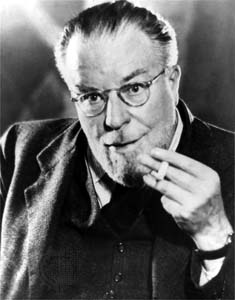
Christopher Morley (5 mei 1890 – 28 maart 1957)
De Franse dichter, schilder en criticus George Albert Aurier werd geboren op 5 mei 1865 in Châteauroux. Zie ook alle tags voor George Albert Aurier op dit blog.
Uit: Les Isolés, Vincent van Gogh
« Au reste ; ce respect et cet amour de la réalité des choses ne suffisent point, seuls, à expliquer et à caractériser l’art profond, complexe, très-à-part, de Vincent Van Gogh. Sans doute, comme tous les peintres de sa race, il est très conscient de la matière, de son importance et de sa beauté, mais aussi, le plus souvent, cette enchanteresse matière, il ne la considère que comme une sorte de merveilleux langage destiné à traduire l’Idée. C’est, presque toujours, un symboliste. Non point, je le sais, un symboliste à la manière des primitifs italiens, ces mystiques qui éprouvaient à peine le besoin de désimmatérialiser leurs rêves, mais un symboliste sentant la continuelle nécessité de revêtir ses idées de formes précises, pondérables, tangibles, d’enveloppes intensément charnelles et matérielles. Dans presque toutes ses toiles, sous cette enveloppe morphique, sous cette chair très chair, sous cette matière très matière, gît, pour l’esprit qui sait l’y voir, une pensée, une Idée, et cette Idée, essentiel substratum de l’œuvre, en est, en même temps, la cause efficiente et finale. Quant aux brillantes et éclatantes symphonies de couleurs et de lignes, quelle que soit leur importance pour le peintre, elles ne sont dans son travail que de simples moyens expressifs, que de simples procédés de symbolisation. Si l’on refusait, en effet, d’admettre sous cet art naturaliste l’existence de ces tendances idéalistes, une grande part de l’œuvre que nous étudions demeurerait fort incompréhensible. Comment expliquerait-on, par exemple, le Semeur, cet auguste et troublant semeur, ce rustre au front brutement génial, ressemblant parfois et lointainement à l’artiste lui-même, dont la silhouette, le geste et le travail ont toujours obsédé Vincent Van Gogh, et qu’il peignit et repeignit si souvent, tantôt sons des ciels rubescents, de couchant, tantôt dans la poudre d’or des midis embrasés, si l’on ne veut songer à cette idée fixe qui hante sa cervelle de l’actuelle nécessité de la venue d’un homme, d’un messie, semeur de vérité, qui régénèrerait la décrépitude de notre art et peut-être de notre imbécile et industrialiste société ? Et aussi cette obsédante passion pour le disque solaire, qu’il aime à faire rutiler dans l’embrasement de ses ciels et, en même temps, pour cet autre soleil, pour cet astre végétal, le somptueux tournesol, qu’il répète, sans se lasser, en monomane, comment l’expliquer si l’on refuse d’admettre sa persistante préoccupation de quelque vague et glorieuse allégorie héliomythique ? »
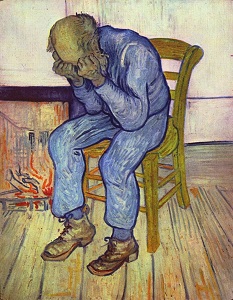
George Albert Aurier (5 mei 1865 – 5 oktober 1892)
Op de drempel van de eeuwigheid door Vincent van Gogh, 1890
De Poolse schrijver en journalist Henryk Sienkiewicz werd geboren in Wola Okrzejska op 5 mei 1846. Zie ook alle tags voor Henryk Sienkiewicz op dit blog.
Uit: Quo vadis? (Vertaald door Jeremiah Curtin)
“Of course they do. Thou wilt not pass any basilica, bath, library, or book-shop without seeing a poet gesticulating like a monkey. Agrippa, on coming here from the East, mistook them for madmen. And it is just such a time now. Cxsar writes verses; hence all follow in his steps. Only it is not permitted to write better verses than Cxsar, and for that reason I fear a little for Lucan. But I write prose, with which, however, I do not honor myself or others. What the lector has to read are codicilli of that poor Fabricius Veiento.” “Why ‘poor’?” “Because it has been communicated to him that he must dwell in Odyssa and not return to his domestic hearth till he receives a new command. That Odyssey will be easier for him than for Ulysses, since his wife is no Penelope. I need not tell thee, for that matter, that he acted stupidly. But here no one takes things otherwise than superficially. His is rather a wretched and dull little book, which people have begun to read passionately only when the author is banished. Now one hears on every side, `Scandala! scandala!’ and it may be that Veiento invented some things; but I, who know the city, know our patres and our women, assure thee that it is all paler than reality. Meanwhile every man is searching in the book,—for himself with alarm, for his acquaintances with delight. At the book-shop of Avirnus a hundred copyists are writing at dictation, and its success is assured.” “Are not thy affairs in it?” “They are; but the author is mistaken, for I am at once worse and less flat than he represents me. Seest thou we have lost long since the feeling of what is worthy or unworthy,—and to me even it seems that in real truth there is no difference between them, though Seneca, Musonius, and Trasca pretend that they see it. To me it is all one!”

Henryk Sienkiewicz (5 mei 1846 – 15 november 1916)
Cover audioboek
De Engelse dichter Richard Watson Dixon werd geboren in Islington op 5 mei 1833. Zie ook alle tags voor Richard Watson Dixon op dit blog.
Too Much Friendship. The Story Of Septimius And Alcander (Fragment)
Alas, as soon as ever Septimius set eyes on the lady
Hypatia — or rather she set eyes on him — he knew
that he was madly in love with her ! At this point
the srave Alcander becomes inhuman in the correct-
ness of his attitude. That magnanimity should
forbid anger, may be right, though we should have
chosen a warmer word — his ‘large firm eyes filled
with concern and pity,’ are well enough — but the
philosophic turn of mind which makes him instantly
recall every work that he had ever read on Friend-
ship, the arithmetical nicety with which he balances
his emotional account without a thought of the lady,
is altogether too Gibbonian. He does not even
‘sigh as a lover’ Avhile he ‘obeys’ as a friend. This
is not ‘Too Much Friendship,’ it is ‘Too Much
Philosophy.’ No doubt the problem, for any one
Avho cares about friendship, is harder than it looks
at first sight. Shakespeare himself came to grief
over it in The Two Gentlemeii of Verona ; but
Valentine’s impetuous offer of Sylvia to Proteus,
though loyalty cries out against it, rings true beside
this calculated and selfish self-denial. Hypatia, very
naturally, seems to have been glad of the exchange ;
but Hypatia’s kinsmen took a different view, and
they made the life of Alcander a burden to him.
‘The words the words pursued.’
His own words were not of the least avail, and at
last he was sold for a slave; but still Apollo went
smiling on, and Alcander communed with books and
wrote on frizzled skins and kept himself alive with Hope.
‘ Hope who still drops her anchor in life’s sand,
And to firm hold the atoms loose would band,
That life’s tossed ship outride the tempest’s rage ;
Hope, that to ease turns pain, to youth turns age :
Hope, that in mortal nature so is fixed,
That no damned wretch in misery’s mortar mixed,
No sodden villain brought to extreme shame.
Would change to other, and not be the same :
Albeit both high and low would willingly
Add to themselves another’s share of good,
Desiring this man’s fame, and that man’s Avealth,
Yonder man’s beauty, and that other’s health;
So they these goods upon their own might pile.
But never cease to be themselves the while :
Hope bade him live.’

Richard Watson Dixon (5 mei 1833 – 23 januari 1900)
Cover
Onafhankelijk van geboortedata:
De Romeinse dichter Gaius Valerius Catullus werd geboren in 87 v. Chr, in Sirmione bij Verona Zie ook alle tags voor Catullus op dit blog.
Carmina
III
Rouwt Lieflijkheden, rouwt Begeerlijkheden,
rouwt menschen van beschaving en gevoel!
Het sijsje van mijn meisje is gestorven,
het sijsje waar mijn meisje meer van hield,
meer zelfs misschien dan van haar eigen oogen.
Zoo snoezig was het, en het kende haar,
de vrouw, zoo goed als ieder kind zijn moeder.
Het was niet weg te lokken van haar schoot;
daar hippelde het aldoor heen en weer
en tjilpte maar om haar, zijn lieve vrouw.
Nu gaat het zieltje langs de duistre baan,
vanwaar men zegt dat geen terugkeer is.
Vervloekt, gij duisternissen van de hel,
die alles opslokt wat bekoorlijk is!
Zoo’n aardig sijsje hebt gij mij ontrukt.
O wandaad! O arm sijsje! ’t Is om jou,
dat nu de oogjes van mijn zoetelief
rood en gezwollen van de traantjes zijn.
IV
O wandelaars, het jacht dat gij hier voor u ziet,
beweert het allersnelste schip geweest te zijn
en mededinging van geen enkel drijvend hout
gevreesd te hebben, ’t zij door riemen voortgestuwd,
of met de bolle zeilen vliegend voor den wind.
Dat zal, zoo zegt het, noch de kust der Adria,
noch der Cycladen archipel ontkennen, noch
’t roemruchtig Rhodos, ’t onherbergzaam Thracisch oord
der Dardanellen of het Zwartezeegebied,
waar dat wat nu een jacht is, een bosschage was.
Want op den kam van den Cytorus placht zijn kruin,
zijn bladerdos, te ruischen in den avondwind.
Amastris en Cytorus aan de Zwarte Zee,
gij, zegt het jacht, dat dit heel goed geweten hebt
en nog wel weet; dat sedert menschenheugenis
het op uw top gestaan heeft en uw watervlak
heeft op doen spatten door der riemen plassend spel
en toen vandaar door al dat bruisend zeegeweld
zijn baas gevoerd heeft, ’t zij de wind van bakboord blies,
het zij van stuurboord, dan wel zonder onderscheid
van achteren de beide schooten strak deed staan,
en nooit een schietgebedje noodig heeft gehad,
ook op zijn laatste reis niet, toen het van de zee
zijn weg vond naar de oevers van dit blanke meer.
Dat was weleer. Maar nu is het gepensioneerd
en wijdt den kalmen levensavond die nog rest,
aan broeder Castor en aan Castors tweelingbroer.
Vertaald door A. Rutgers van der Loeff
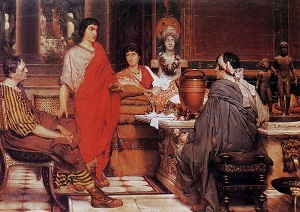
Catullus (87 v. Chr – 54 v. Chr.)
Catullus at Lesbia’s door Sir Lawrence Alma-Tadema
Zie voor nog meer schrijvers van de 5e mei ook mijn blog van 5 mei 2018 deel 2.

